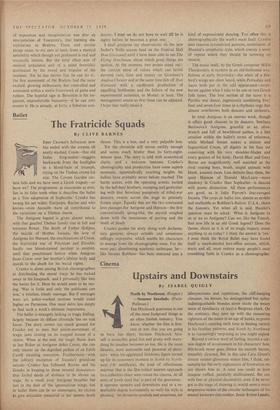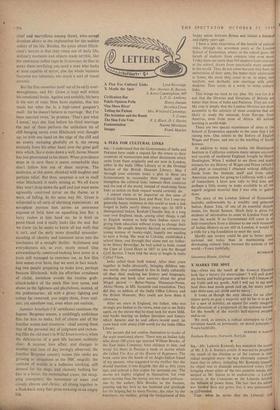Cinema
Upstairs and Downstairs
By ISABEL QUIGLY
North by Northwest. (Empire.) --Summer Interlude. (Paris- Pullman.) THE Hitchcock guarantee is one of the most foolproof things in an often foolish industry. You know, whether the film is first- rate or not, that you are going to have fun there: because Hitchcock him- self is invincibly good fun and pretty well every- thing he touches becomes so too. He is the most likeable, most noticeable and personal of direc- tors: when his eggshaped fetishistic figure turned up for its customary moment in North by North- west (`A' certificate), the kind of affectionate murmur that is the film critics' nearest approach to a collective cheer went round the cinema. At all sorts of levels (and that is part of the guarantee : it operates upstairs and downstairs and to a re- markable degree horizontally as well) his style is pleasing : his favourite symbols and situations, his idiosyncrasies and repetitions, his cliff-hanging climaxes, his heroes, his distinguished but rather indistinguishable blondes never excite the weary sense of familiarity. of (say) a Bergman clock, On the contrary, they turn up with the reassuring rightness of the moon in an age of luniks, to prove Hitchcock's cunning each time in finding variety in his familiar patterns; and North by Northwest is as reassuringly surprising as you might expect.
Beyond a certain level of feeling, beyond a cer- tain degree of involvement in his characters' fate, Hitchcock never goes. Hence his smooth heroes, smoothly directed. But in this case Cary Grant's almost sinister glossiness makes him, I think, un- suitable for the early nightmares of frustration we are shown him in. 'A man you could at least imagine ruffled, painfully disillusioned, flat out with fear or physical discomfort, even if he never got to the stage of showing it, would seem a more responsive victim of the circular techniques of his mental torturers (his mother, Jessie Royce Landis,
chief and marvellous among them), who,accept drunken idiocy as the explanation for the sudden oddity of his life. Besides, the point about Hitch-
cock's terrors is that they come out of daily life, ordinary moments and objects made terrible, like
the enormous coffee cups in Notorious; so that to make them terrifying you need a man who looks at least capable of terror, else the whole business becomes too inhuman, too much a sort of visual .acrostic.
But the film smoothes itself out of its early over- wroughtness, and Mr. Grant is kept well within his emotional limits. Ageless and amiable, his hero is the sort of man, Miss Saint explains, that has made her what she is, a high-toned gangster's moll : for he doesn't believe in marriage. 'But I've been married twice,' he protests. 'That's just what I mean,' says she. Just before his third marriage the pair of them perform the unlikeliest bit of cliff-hanging surely even Hitchcock ever thought up, he with one hand on the edge of the cliff and an enemy stamping gleefully on it, she swung simianly from his other hand over the great gulf into which, like a stone down a well, James Mason has just plummeted to his doom. When providence steps in to save them it seems remarkable they don't follow him out of sheer surprise. The audience, at this point, shrieked with laughter and perhaps relief. But then, suspense is not in itself what Hitchcock is really aiming at. We all know they won't drop down the gulf and just want some agreeably contrived terror on the theme, as it were, of falling. In the same way Mr. Grant is subjected to all sorts of alarming experiences : an aeroplane pursues him across an enormous' expanse of field, bent on squashing him flat; a lorry rushes at him head on; he is fired on point-blank and it really looks like the end. But we know (as he seems to know all too well) that it isn't, and the early more dreadful misunder- standing of identity and intention turns into the mechanics of a straight thriller. Stylishness and everydayness are, as ever, nicely mixed. One extraordinarily contrived-looking love scene in a train still managed to convince me, as few film Jove scenes ever have, that we were in fact watch- ing two people preparing to make love; perhaps because Hitchcock, with his effortless avoidance of cliché, somehow avoids the routine grab- .clinch-hold-it of the stock film love scene, and shows us the lightness and playfulness, instead, of the preliminaries : all with a glossy lighting and colour far removed, you might think, from real- ism; yet somehow real, even when not realistic.
Summer Interlude ('A' certificate) continues the Ingmar Bergman season, a middlingly ambitious film for him to make, full of charm and of the familiar scenes and situations : chief among them that of the personal day of judgment and reckon- ing (like the old man's in Wild Strawberries), when the deficiencies of a past life become suddenly clear. A summer love affair, and changes in weather and time of day lovingly observed; the familiar Bergman country noises (his rooks are growing as ubiquitous as the BBC seagull); the contrast of worlds in a ballerina smoking, still dressed for the stage, and clumsily bathing her feet in a basin; the moustached crone; the strap- ping youngsters; the movement of water and clouds; clowns and clerics ; all strung together in a flash-back story that gives meaning to an empty life.







































 Previous page
Previous page